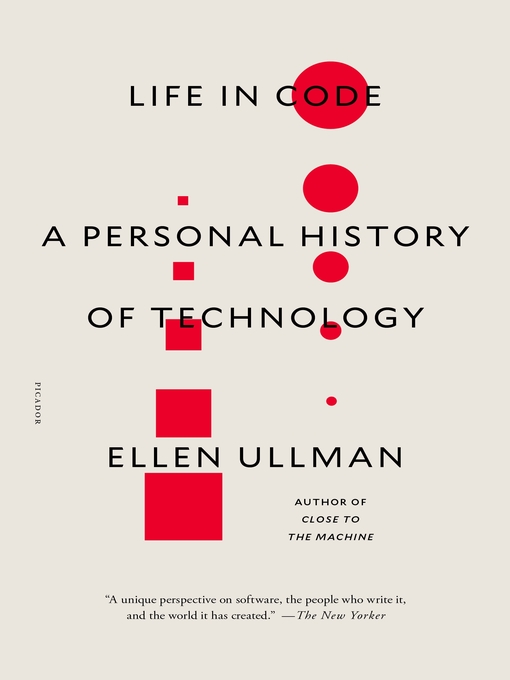
Life in Code
A Personal History of Technology
کتاب های مرتبط
- اطلاعات
- نقد و بررسی
- دیدگاه کاربران
نقد و بررسی

May 15, 2017
Novelist and former computer programmer Ullman returns to the domain of her seminal memoir, Close to the Machine (1997), an unflinching insider’s account of the digital revolution, with this equally eloquent collection of previously published essays from the past 20 years. Providing much-needed nuance to the binary world of code, the essays gracefully move between intimate anecdotes, frustrated rants about the unconscious bias and hypercompetitiveness that dominate much of venture-capitalist startup culture, philosophical meanderings about artificial intelligence and the nature of human thought, and big-picture analysis about the relationship between technical design and human desire. Not only is Ullman an astute observer of the changing culture but she proves prescient on a diverse range of issues including the siloing effect of the internet, the growing digital divide, and corporate-assisted government surveillance. Neither technophilic nor technophobic, this collection creates a time-lapse view of the rapid development of technology in recent years and provides general readers with much-needed grounding for the sweeping changes of the revolution underway. It’s also simply a pleasure to read.

Starred review from June 15, 2017
A sharply written, politically charged memoir of life in the data trenches by computer pioneer Ullman (By Blood, 2012, etc.)."I once had a job where I didn't talk to anyone for two years," writes the author, who is known in computing circles for many things, not least her work on the graphical forerunner to Windows. As Ullman notes, programmers live in "mind-time" and not the ordinary time-space continuum the rest of us inhabit, and in any event they're poorly socialized; one early boss had intended to hire her simply to inflict a woman on an underling ("evidently, Peterson was some manager he wished ill, and I was the ill"), then was demoted to the underling's position and grudgingly had to supervise her himself. Early on, by her account, Ullman brought ethical considerations to bear on her work, reminding teammates on a project that veered into epidemiology that the best solution was not the Nazi one of killing off carriers of a particular disease, which earned her the sneer of a male colleague: "This is how I know you're not a real techie." More than a personal account, Ullman's narrative is a you-are-here chronicle of the evolution of things we take for granted, from the early AI research of the 1970s and the first flickerings of the personal computer to the founding of Google--and now, to a decidedly dystopian present that is the real thrust of a sometimes-rueful confession. As Ullman writes without hyperbole, all the liberatory promise of the personal computer has been swallowed up by corporations. Corporate leaders may promise that they're changing the world, but that proclamation is "but an advertisement, a branding that obscures the little devil, disruption, that hides within the mantra" and threatens to destroy what little civilization we have left. What Anthony Bourdain did for chefs, Ullman does for computer geeks. A fine rejoinder and update to Doug Coupland's Microserfs and of great interest to any computer user.
COPYRIGHT(2017) Kirkus Reviews, ALL RIGHTS RESERVED.

July 1, 2017
Entering the predominantly male profession of computer programming, Ullman armed herself with the understanding that I was not afraid of machines, and an honors thesis onMacbeth. As a woman in a field dominated by arrogant, young, white males, she withstood many insults and humiliations. Self-taught, she wrote code and learned to admire the elegance of well-written code. In the 20 years since her groundbreaking memoir, Close to the Machine, she has continued to write, including two novels and the essays gathered here, which span the last 25 years. Ullman chronicles tech developments, Y2K, the early promise and fears associated with the burgeoning Internet, and the boom, crash, and boom of tech stocks and start-up culture. Throughout it all, Ullman maintains a healthy skepticism regarding the notion that technology will cure all that ails us. In the section on intelligent machines and artificial intelligence, for example, she brilliantly questions the computer's capacity for sentience. The error in robotics, she writes, is mistaking the tool for its builder. Ullman also astutely observes, robots aren't becoming us, I feared; we are becoming them. (Reprinted with permission of Booklist, copyright 2017, American Library Association.)

























دیدگاه کاربران